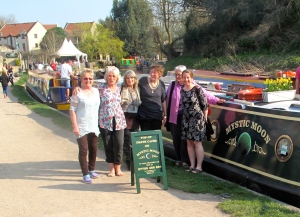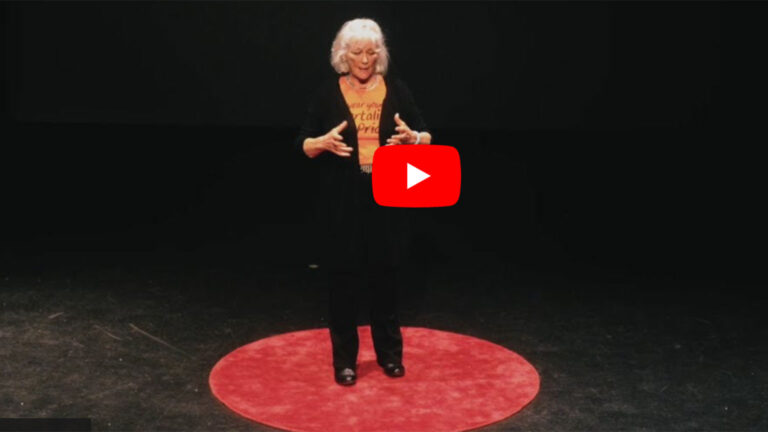The first three pop-up death cafes on Mystic Moon have now taken place at Bradford on Avon wharf, Devizes wharf, and along the towpath at Pewsey.
All three were very different, but completely special in their own way, and I am so grateful to all who came and spoke so honestly about their experiences of death and dying.
Even though most participants didn’t know each other, I was amazed at how, very early on, themes emerged from each group, forming a wonderful bond of shared trust and understanding.
I couldn’t possible write about all we spoke of, but I have hopefully captured salient points that came from each cafe.

Bradford on Avon: End of life care
A beautiful afternoon at Bradford on Avon wharf welcomed four courageous souls to the first pop-up death café on Mystic Moon. This was co-hosted by Liz Rothschild, funeral celebrant, manager of Westmill Woodland Burial Ground, and Director of the Kicking the Bucket festival.
Two main threads ran through our meeting as we drank tea and munched on cake: caring for others as they die, and the importance of practically preparing for our own death.
One participant told us how she knew of a family who almost fell apart when a parent began to die, purely because the parent had not made their wishes known. ‘One of the children wanted a traditional funeral for their parent. Another wanted something completely different. It led to sever conflict.’
Sadly, we had all heard similar stories.
One participant, an ex-paramedic, told us about the Lion’s Club Message in a Bottle scheme, which is a simple idea designed to encourage people to keep their personal and medical details on a standard form and in a common location – the Fridge (please go to the link for further information). We agreed it would be a great idea to add our Advance Directives, and even Wills, to the bottle!
We moved on to talk at length about the changes that happen to a body after death. This led into a moving account from one participant about her mother’s death in hospital. She had no idea how quickly the undertaker would arrive after they had been called. She wasn’t ready for her mother’s body to be taken away, but was too fearful to ask for more time with her. ‘I felt as if she was being ripped away from me,’ she said.
This prompted a conversation about the legalities of shrouds, open coffins, and funeral directors. Liz explained that it is not a legal requirement to use a funeral director, or have a coffin. She recommended Dying Matters and The Natural Burial Centre to those who wanted further information and resources about different ways of caring for the dead.
We all agreed that we wished we could do more for those approaching the end of life, and to find ways of making their death better, even happier. One participant spoke of thinking about training as a soul midwife, which introduced the work of Felicity Warner and her School of Soul Midwifery.
Most of us agreed that we had regrets about the death of someone we loved. One participant told us how she wished she had taken her dying mother into the garden at night so she could have died under the stars. ‘She would have loved that,’ she said, with tears of regret in her eyes. ‘But what on earth would the carers have said?’
It was a thought-provoking way to conclude our pop-up death café, but our varied conversations had forced each one of us to think more carefully about the end of life care we want to receive, the importance of making an Advance Decision and making this known to our GPs as well as family members. It also made us more aware of the needs of those who are dying, and how we could care for them after death.
But it was particularly gratifying to hear one participant say that this pop-up death cafe had inspired her to consider making a career in end of life care.

Devizes wharf: Friends who die
This second pop-up death café was co-hosted by Rose-Anne O’Hare, an Occupational Therapist who specailises in Dementia. The main theme to emerge from the group was how to negotiate the very sensitive and often difficult relationship with the family of a friend who is dying.
One participant was currently experiencing this with a friend she has known since childhood. ‘When I asked her husband if I could see her, he said she was too ill and needed rest. But all I want is to sit with her for a few minutes,’ she said. ‘We’ve known each other for over fifty years,’ she added, ‘that’s more than anyone else in my or her life. Do I really need her family’s permission to see her?’
Another participant put across a different point of view by telling us about her husband’s protracted death from cancer. ‘He had a dreadful death, caused by a medical misdiagnosis. He didn’t want people to see him in an oxygen mask looking so awful so he refused to allow anyone in.’
A third participant spoke about the death of one her friends, and how it impacted her. ‘It was desperately sad because she died so young, leaving small children behind. So her dying process pervaded the lives of all who knew her. But we were encouraged to take part in an extraordinary funeral created by her husband, where the five-year-old daughter stood on a plank over her mother’s grave and threw spade-fulls of earth onto of her coffin. That image will stay with me for the rest of my life.’
This led to a discussion about the anger and guilt that people often experience after someone dies, especially from cancer. One participant said she still felt enraged years after the death of her husband due to the ‘appalling care he received in hospital from those “specialists”. I should have done something about it.’
Another said that she found it very upsetting when someone had told her that her friend had died of cancer because of ‘unresolved issues.’ ‘That makes it sound as if her cancer was self-inflicted. It left me feeling guilty that I hadn’t done more to help her resolve whatever she was meant to.’
Someone else spoke about her guilt of not being able to care for her husband because he died so quickly. ‘I felt robbed of being able to care for him, and I will always feel guilty about that.’
‘Why do such awful things happen, when life seems to be going well?’ asked one participant.
None of us could answer this, or even try to, although most of us agreed with one participant who said, ‘I think life is a learning process, and we are here to try and get it right before we die.’
This led to a discussion about how we could indeed, get things right. Someone said that she thought we naturally begin to think about death as we grow older. ‘I think we need to,’ she said. ‘It makes me more appreciative of what I have.’
Someone else said that she knew of a person who decided to have a wake before she died, so she could meet with all her friends and hear them say lovely things about her. ‘She couldn’t see the point of having a wake after she was dead.’
Another participant told us how she had written to her dying friend to say goodbye. ‘We had never talked about her illness, but I needed to name it and say farewell to her. I am so glad I did that.’
Our pop-up café concluded with the participant whose friend is dying saying that our talk had helped her find a way to say goodbye to her. ‘Yes, I am going to do that. It matters.’

Pewsey: Dealing with Suicide and Sudden Death
The third pop-up was co-hosted by Alexandra Wax, a psychotherapist who lives and works in Marlborough. As soon as we had gathered on Mystic Moon, sudden death and suicide emerged as the group’s main theme.
One participant spoke of his shock of friends and acquaintances literally running away when they saw him. ‘I was standing in a car park with my sons, and saw a good friend of my wife’s. She couldn’t even look at me. I still find that really difficult to forgive.’
One participant found her husband dead on the floor, and had to break the news to everyone. ‘It was okay, except you soon realise who your friends are.’
Another participant spoke about a family member committing suicide, and how hard it was for her to deal with the aftermath. ‘I didn’t feel angry with the person, or anything like that for doing it, but it was the attitude of other people that I found the worst.’
Someone spoke about working in a school environment, and having to cope with the sudden death of a student. ‘It’s such a mixture of emotions,’ she said. ‘You are dealing with your own feelings of knowing this young person at the same time as supporting their friends, and then there’s the parents, not to mention other work colleagues.’
This led to a conversation about how much better young people seem to be at dealing with death than older people. One participant told us that when the son of a friend was killed by a car, his friends carried his coffin, took an active part in his funeral, and still hold a memory day for him on the anniversary of his death.
‘They seem to be okay with it all,’ she said. ‘It us older ones who struggle so much.’
This opened up a discussion about creating a new life after a spouse or partner died. Two participants spoke about how difficult it was to move on following the death of their spouse, especially when they began dating again. ‘I felt so guilty. I almost needed permission,’ said one. The other said, ‘I felt guilty because of the children. It was very hard to introduce my new partner to them even though they seemed alright about it.’
Another admitted that they were now dating a new partner but experiencing unpleasant resistance from family members. ‘I want to be happy again. But they don’t like it at all and I am not sure what to do to about it.’
One participant spoke about what it was like to see her father with a new partner. ‘It’s such a strange feeling because I wanted him to find happiness again, but I missed my mother very much. I found it very difficult when I saw her put her hand on his knee, just like mum used to do.’
Another participant said that when her mother started dating again, she was okay with it. ‘He didn’t try to be my father. That was really important, because nobody could take Dad’s place.’
We concluded the death café by talking about how sudden death and death by suicide makes you very aware of your own mortality. ‘It made me feel very vulnerable and very aware I am going to die too,’ said one participant. Another said, ‘It makes you realise you’ve only got one life. You have to live it while you can.’
A third said, ‘It makes me value every moment of every day. You’re never going to have this again, so why waste it?’
Too right.





